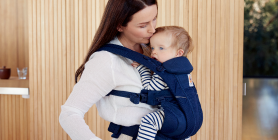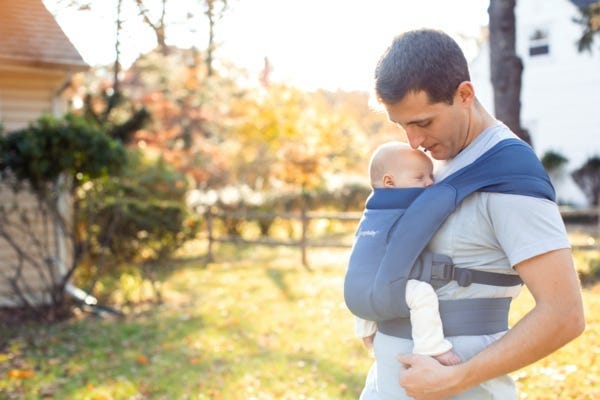
Pregnancy is an intense period in any woman’s life, filled with surprisingly rich and varied emotions, as well as visions of your future life as a mother. Amidst the joyful prospects of soon being able to welcome your little one, some expectant mothers are concerned that they may develop a postpartum mood disorder or depression. Postpartum depression is among the most disabling disorders for women in their childbearing years and the leading cause of non-obstetric hospitalization among women in the United States, affecting as many as 1 in 5 women. And because it happens during that very period where the new baby is the most vulnerable and sensitive to a mother’s mood and behavior, this depression can have a strong impact on the developing child, as well as the whole family. In this article, we will review the basic understanding of postpartum depression, and uniquely, we will describe the potential direct and indirect contributions of parent-baby skin-to-skin contact and babywearing in alleviating postpartum depression. These benefits are not often understood among depression researchers nor described on many of the popular parenting or postpartum depression websites. First, what are the signs of postpartum reaction you need to look out for? Clinicians distinguish between “baby blues” (which last anywhere from a few days to two weeks) and depression (with longer-lasting and more severe symptoms).
The symptoms of “baby blues” include:
- Mood swings
- Anxiety
- Sadness
- Irritability
- Feeling overwhelmed
- Crying
- Reduced concentration
- Appetite problems
- Trouble sleeping
Postpartum depression symptoms may include:
- Depressed mood or severe mood swings
- Excessive crying
- Difficulty bonding with your baby
- Withdrawing from family and friends
- Loss of appetite or eating much more than usual
- Inability to sleep (insomnia) or sleeping too much
- Overwhelming fatigue or loss of energy
- Reduced interest and pleasure in activities you used to enjoy
- Intense irritability and anger
- Fear that you're not a good mother
- Feelings of worthlessness, shame, guilt or inadequacy
- Diminished ability to think clearly, concentrate or make decisions
- Severe anxiety and panic attacks
- Thoughts of harming yourself or your baby
- Recurrent thoughts of death or suicide
Untreated, postpartum depression may last months or even longer, severely afflicting the entire family. It is hence no surprise that large research efforts have gone into alleviating depression. Currently, the two major medically recognized pathways are talk therapy (Interpersonal Therapy, Behavior Therapy, Cognitive-Behavioral Therapy) and medication. Taking depression medication while breastfeeding is a complicated subject, with large debate around some of the mainstream anti-depressants and mixed results for mild and moderate depression. There is good emerging evidence for aerobic (getting that pulse up) exercise being just as effective as medication in alleviating mild to moderate depression. However, this evidence is not mainstream and not often suggested among depression clinicians. The current evidence for various forms of peer-to-peer social support is not well studied, but may in fact, be very effective for some mothers. Apart from the two medically recognized treatment pathways, there exists a range of less scientifically investigated stress management tools, which include elicitation of the relaxation response, breath focus, guided imagery, touch therapy, bright light therapy, acupuncture, mindfulness meditation, yoga, tai chi, qigong, healthy eating, repetitive prayer, social support and diary-keeping. Depression is a very tricky condition for a number of reasons: Lack of awareness of the signs of depression is the first challenge. But even when the depressed person in fact ticks off most items on the symptoms list, denial may often the response. It can often be tied to self-image – “I am not the type of person to get depressed – I can get through this rough patch on my own”. Unfortunately, this can be a contributor to the onset of the depression in the first place, so it creates a bit of a Catch-22 situation. Concerns about admitting to a “mental illness” with all the stigma associated with it, including current and future job prospects, also influence denial. Accessibility and cost of services is also a barrier. Depression after birth has that extra burden of a newborn requiring your presence around the clock, upsetting all normal routines, leading to complete exhaustion. Being utterly exhausted is not the best foundation for the potentially daunting task of seeking out an unknown mental health provider or a counselor. Even healthy mothers often avoid contact with close family and friends in the time after birth, because adjusting to a newborn can be such a fragile, demanding and absorbing process. With all these challenges to alleviating postpartum depression, finding a simple solution could make quite a difference. If only there was a way out of this feeling, which required very little of the mother, didn’t involve strangers, could initially be done at home, and didn’t require admitting to being depressed…. A recent Canadian study shows promise in addressing this prevalent issue among new mothers. The study investigated two groups of middle-class, low-risk women. One group was asked to engage in daily skin-to-skin contact with their newborn for a few hours during the first month following birth (which they did). The other group was not given such a suggestion, and these mothers turned out to provide little or no skin-to-skin contact in the first month. Depressive symptoms were measured for both groups at 1 week and 1, 2 and 3 months. Mothers providing daily skin-to-skin contact to their newborn had significantly lower scores on the depression scales (indicating that they were less depressed) when the infants were one week and marginally significantly lower scores when the infants were one month, but no significant differences at 2 and 3 months, where depressive symptoms were few for both groups. The depressive symptom scores were below the risk zones for most of the mothers in both groups. Some mothers, however, scored in the risk zone for depression, and were hence suffering the most. These mothers were virtually all in the control group, who did not engage much in skin-to-skin contact. When looking at one of the physiological markers of stress, levels of cortisol in the saliva in the morning, skin-to-skin contact mothers had a greater reduction in their salivary cortisol than mothers in the control group in the course of the first month following birth. This study is the first ever to follow the effects on depressive symptoms of mother-baby skin-to-skin contact over several months and provides us some highly interesting insights and inspiration. Having experienced the joys of extended close contact, mothers should be willing to engage in babywearing – carrying one’s baby in a wrap or soft structured carrier. This will allow the mother to go about her daily chores, while still maintaining close contact, providing a range of vital and age-appropriate stimuli to the baby – and to herself. If babywearing is combined with brisk walks in the morning (naturally carrying the baby all along), mothers get the added benefits of exercise and daylight. Interestingly, both light therapy (exposure to either sunlight or sun-like electrical light sources) and exercise have been found to be effective, so don’t underestimate the power of fresh air and sunshine. Gradually breaking the social isolation by simply getting out for morning walks may also lead to a desire to engage with other mothers to share the joys and tribulations of motherhood. If none of your friends have become mothers at the same time as you have, one alternative option is to join one of the many volunteer babywearing groups or local neighborhood groups popping up all around. These groups host regular open and accessible sessions at a local café or meeting hall. Many new and mutually inspiring friendships are formed during these meetings. If there isn’t Babywearing or family support group in your area, consider starting one. Set yourself up for success with a support network before baby’s arrival. Research certainly supports the benefits of both receiving social support and, equally important, of providing support through volunteering. These simple steps are likely to help in alleviating mild or moderate depression. References: http://www.babycenter.com/0_drug-safety-while-breastfeeding_8790.bc Berle JO, Spigset O. Antidepressant Use During Breastfeeding. Curr Womens Health Rev. 2011 Feb;7(1):28-34 Bigelow A, Power M, Maclellan-Peters J, Alex M, McDonald C. 2012. Effect of Mother/Infant Skin-to-Skin Contact on Postpartum Depressive Symptoms and Maternal Physiological Stress. J Obstet Gynecol Neonatal Nurs. 2012 Apr 26. Blumenthal JA, Smith PJ, Hoffman BM. Is Exercise a Viable Treatment for Depression? ACSMs Health Fit J. 2012 Jul;16(4):14-21. Dennis CL, Dowswell T. Interventions (other than pharmacological, psychosocial or psychological) for treating antenatal depression. Cochrane Database Syst Rev. 2013 Jul 31;7 Dennis CL. Psychosocial interventions for the treatment of perinatal depression. Best Pract Res Clin Obstet Gynaecol. 2014 Jan;28(1):97-111. Dennis CL. The process of developing and implementing a telephone-based peer support program for postpartum depression: evidence from two randomized controlled trials. Trials. 2014 Apr 17;15:131 Fournier JC, DeRubeis RJ, Hollon SD, Dimidjian S, Amsterdam JD, Shelton RC, Fawcett J. Antidepressant drug effects and depression severity: a patient-level meta-analysis. JAMA. 2010 Jan 6;303(1):47-53 Hollon SD, Ponniah K. A review of empirically supported psychological therapies for mood disorders in adults. Depress Anxiety. 2010 Oct;27(10):891-932. Jenkinson CE, Dickens AP, Jones K, Thompson-Coon J, Taylor RS, Rogers M, Bambra CL, Lang I, Richards SH. Is volunteering a public health intervention? A systematic review and meta-analysis of the health and survival of volunteers. BMC Public Health. 2013 Aug 23;13:773. Lambert GW, Reid C, Kaye DM, Jennings GL, Esler MD. Effect of sunlight and season on serotonin turnover in the brain. Lancet. 2002 Dec 7;360(9348):1840-2 Letourneau N, Stewart M, Dennis CL, Hegadoren K, Duffett-Leger L, Watson B. Effect of home-based peer support on maternal-infant interactions among women with postpartum depression: a randomized, controlled trial. Int J Ment Health Nurs. 2011 Oct;20(5):345-57. Melrose S. Seasonal Affective Disorder: An Overview of Assessment and Treatment Approaches. Depress Res Treat. 2015;2015: Meltzer-Brody S, Jones I. Optimizing the treatment of mood disorders in the perinatal period. Dialogues Clin Neurosci. 2015 Jun;17(2):207-18. PubMed PMID: 26246794 Pampallona S, Bollini P, Tibaldi G, Kupelnick B, Munizza C. Patient adherence in the treatment of depression. Br J Psychiatry. 2002 Feb;180:104-9. Paulson JF, Bazemore SD. Prenatal and postpartum depression in fathers and its association with maternal depression: a meta-analysis. JAMA. 2010 May 19;303(19):1961-9 'You're depressed'; 'no I'm not': GPs' and patients' different models of depression. UMDS MSc in General Practice Teaching Group. Br J Gen Pract. 1999 Feb;49(439):123-4
Emotional Benefits of Getting Outside
Spending time in nature with your baby can strengthen the bond between you. The simple act of holding your baby close, feeling their warmth, and sharing new experiences together can create strong emotional connections. It’s also a wonderful way to reduce stress and improve your mood. When my littles were extra fussy, I’d take a walk around the neighborhood. Even though I don't live in an area with trails and surrounded by nature, simply behind outside changed everything. A little vitamin D does wonders!
Cognitive Development
Nature is a sensory wonderland for babies. The different sights, sounds, and smells can stimulate your baby’s senses and promote cognitive development. Watching leaves rustle, hearing birds chirp, and feeling the texture of a tree bark can all contribute to their learning and development.
All About Baby Carriers for Nature Adventures
Choosing the Right Baby Carrier
When it comes to selecting the best baby carrier for summer adventures, there are several options to consider.
Types of Baby Carriers:
- Wraps: Perfect for newborns, providing a snug and secure fit.
- Slings: Ideal for quick and easy use, offering good ventilation.
- Soft Structured Carriers: Versatile and comfortable for both parent and baby, suitable for longer trips.
Factors to Consider:
- Baby’s Age and Weight: Ensure the carrier is appropriate for your baby’s size and weight. For example, Ergobaby’s Embrace Newborn Carrier is perfect for the fourth trimester where baby is small and you’re looking for an easy way to stay close. As they grow, you’ll want to upgrade to an all-position carrier that’s meant for growing babies.
- Parent’s Comfort and Ergonomics: Look for carriers with padded shoulder straps and lumbar support if you’re planning on longer outings.
- Ease of Use: Choose a carrier that is easy to put on and take off.
- Climate and Breathability: Opt for carriers made of breathable fabrics to keep you and your baby cool in hot weather.
Safety Tips:
- Proper Positioning: Ensure your baby is seated correctly, with their legs in an "M" position and their head should be close enough to kiss.
- Checking for Wear and Tear: Regularly inspect your carrier for any signs of damage.
- Ensuring Adequate Support: Make sure the carrier provides proper support for your baby’s head and neck.
Exploring Nature with a Baby Carrier
Ideal Spots for a Nature Walk with Baby
- Parks and Gardens: Great for leisurely walks and picnics.
- Nature Trails and Forests: Perfect for more adventurous outings.
- Beaches and Lakesides: Wonderful for enjoying the water and sand, with the right carrier.
Activity Ideas
- Hiking: Enjoy a scenic hike with a hiking baby carrier that offers support and storage.
- Bird Watching: Use your carrier to keep your baby close while you explore and observe wildlife.
- Picnics: A carrier can free up your hands, making it easier to carry picnic supplies.


Advantages of Using Strollers for Nature Adventures


While baby carriers are fantastic for mobility and closeness, depending on the adventure of choice you might want to be a stroller along too.
There are a LOT of baby stroller options on the market. So we understand how confusing it can be to choose the one that’s right for your family. Not only are there a variety of brands, but a variety of strollers that serve different purposes.
There are a few types of strollers on the market:
- Full-sized stroller: This is typically the stroller parents thing of buying for all its versatility.
- Lightweight or umbrella stroller:These compact strollers are perfect for on-the-go adventures.
- Jogging stroller: Designed for parents who want to combine fitness with outdoor adventures.
- Double stroller: Designed for parents with multiple kids, especially twins.
- Car seat carrier: These strollers connect to a specific car seat. We don't typically recommend these as they can be unsafe for baby and uncomfortable for parents who are pushing.
Learn more about the types of strollers and which one would be best for you.
Benefits of Bringing a Stroller
- Storage Space for Gear: Ample room for carrying all your essentials like a diaper bag, beach toys and more.
- Shade and Weather Protection: Built-in canopies to shield your baby from the sun when they are lounging.
- Options: If you have more than one kid, you can stroll with one and carry the other. Or, if you’re getting warm or your little one is getting fussy, you can switch up their position from stroller to carrier or vice versa.
Safety Tips for Strollers
- Ensure your stroller is in good working condition. Make sure buckles are still buckling and that there are no rips or holes that could compromise your baby’s safety.
- Use sunshades or bug nets to protect your little one’s skin.
- Securing the baby properly: always buckle up your baby for safety even if you think they are old enough to go without the buckle.
Combining Baby Carriers and Strollers
For the ultimate flexibility, consider using both a baby carrier and a stroller on your outings.
Combining both options allows you to adapt to different situations. Use the carrier for more rugged trails and switch to the stroller for smoother paths or when your baby needs a nap.
Transition Tips
- Smooth Transitions: Plan stops where you can easily switch from carrier to stroller.
- Pack Light: Only bring essentials to make transitions easier.
Tips for a Successful Adventure
Planning Ahead
- Route Planning: Choose baby-friendly trails and parks. Check local mom groups or outdoor groups and get recommendations for the best outings for kids.
- Check Weather Conditions: Avoid extreme heat or unpredictable weather. Even with our most breathable carriers, when it’s hot, it’s hot. And having two bodies against each other in the heat will be naturally hot and sticky already.
- Packing Checklist: Include diapers, snacks, water, sunscreen, and a first-aid kit. These all-position carriers have storage pockets where you can fit some of the items easily!
- Stay Hydrated and Nourished: Pack healthy snacks to keep energy levels up and bring plenty of water for both you and baby.


Summer adventures with your baby are a wonderful way to create lasting memories and enjoy the beauty of nature together. From baby carriers to strollers, Ergobaby products are designed to provide comfort and ease for both you and your little one. So, gear up, get outside, and explore the world with your baby by your side.
Ready to embark on your own summer adventures? Check out Ergobaby’s range of baby carriers and strollers to find the perfect match for your family’s needs. Visit our website today and start planning your next outdoor excursion!
























